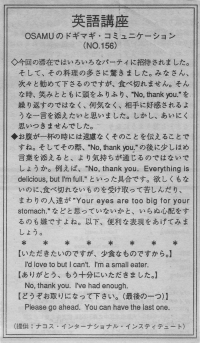もう十分にいただきました。
I'd love to eat more but I can't. I'm a small eater. Osamu was invited to many parties and he was surprised about food- it was too much for him. Everyone was so kind and told him to eat but he couldn't eat everything. At that time, he didn't know what to say so he only smiled and said "No thank you." He wanted to know proper English so that he could give his friends a good feeling. If you are full, you should tell them directly. At that time, "no thank you" is ok but if you can add some sentence, it's better. For example: "Everything is delicious but I'm full." If you don't like something but eat it you will not have a good time. So you should tell your hosts. Japanese people often watch what others eat. Osamu thought that he couldn't be rude and refuse food so he piled his plate full of food. On the other hand, he was worried that people might think he was wasteful because he couldn't eat everything.
今回の滞在ではいろいろなパーティーに招待されました。そして、その料理の多さに驚きました。次々と勧めて下さるのですが、食べ切れません。そんな時、笑みと共に頭をふり、 No thank you. を繰り返すのではなく、何気なく、相手に好感されるような一言を添えたいと思いました。しかし、あいにく思いつきませんでした。
お腹が一杯の時には遠慮なくそのことを伝えることです。そしてその際、 No thank you. の後に少しほめ言葉を添えると、より気持ちが通じるのではないでしょうか。例えば、 No, thank you. Everything is delicious, but I'm full. といった具合です。欲しくもないのに、食べ切れないものを受け取って苦しんだり、まわりの人達が Your eyes are too big for your stomach. などと思っていないかと、いらぬ心配をするのも嫌ですよね。以下、便利な表現をあげてみましょう。
いただきたいのですが、少食なものですから。
I'd love to but I can't. I'm a small eater.
ありがとう、もう十分にいただきました。
No, thank you. I've had enough.
どうぞお取りになって下さい。(最後の一つ)
Please go ahead. You can have the last one.


